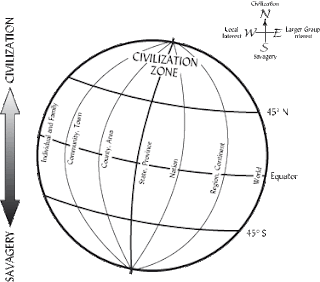If we have a critical mass of people living these Ten
Commandments —and I don’t know the exact percentage or how to measure it, but
I’m sure it’s safely above 50%—we get the benefits of a thriving civilization.
Above the equator on the sphere is much better than below
it. But for true, thriving civilization, it’s better to be above the 45th
parallel (the upper quarter of the sphere). When we are looking at behaviors
that even more fully civilize, I think we can include the list in Paul’s first
epistle to the saints (followers of Christ) in Corinth
The highest, noblest, strongest kind of
love, not merely affection; the pure love of Christ. It is never used [in
scripture] to denote alms or deeds or benevolence, although it may be a
prompting motive.
While the source of this list is definitely from a Christian
(New Testament) perspective, I don’t
think the list excludes any other civilized people. One way to think about this
might be to consider, “would this behavior bring about more harmony within my
family?” which is essentially a micro-civilization.
Charity (or a charitable person) does the following:
- is kind (thoughtful of others, good to them, polite out of caring).
- envieth not (doesn’t hate others for what they have instead of you; doesn’t covet).
- vaunteth not itself; is not puffed up (doesn’t consider self as greater, more important than others—all are created equal, rather than some privileged by birth).
- doth not behave itself unseemly (no indecency, no crassness)
- seeketh not her own (doesn’t manipulate to get all advantages to self at disadvantage to others)
- is not easily provoked (not hotheaded, naturally angry or quick to take offense)
- thinketh no evil (thinking evil could mean giving self permission to break the Ten Commandments—such as purposely bearing false witness, thieving, or murdering)
- rejoiceth not in iniquity, but rejoiceth in truth (doesn’t take delight in evil or indecent acts, but finds truth and civilized behavior to be desirable)
- beareth all things (doesn’t change to renounce civilized behavior just because situations change)
- believeth all things (believes true things, doesn’t mean to be gullible, but is respectfully believing of other honest people)
- hopeth all things (has an expectation that good will result, in the next life at least, but probably also during this life)
- endureth all things (remains civilized not just for today, but till the end of one’s life)
—1
Corinthians 13:4-7, King James Version
Living this way, charitably, with pure love toward others,
we are told will never fail. That is powerful—in ways that those who seek power
over others do not understand. I’m afraid we will, however, fail from time to
time in our efforts. But it may be that, in our own lives, the closer we can move
toward living this way, the more of our lives we spend doing it, hour by hour, day by day, and
year by year, the more beautifully civilized our personal life will be.
There may not be a greater gift we can give to our God,
ourselves, our families, or our society than to live as best we can with pure
love, or charity.

No comments:
Post a Comment